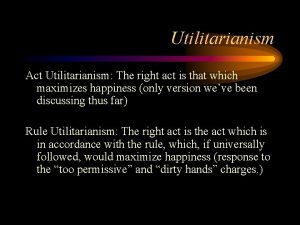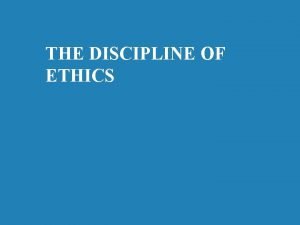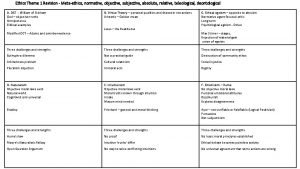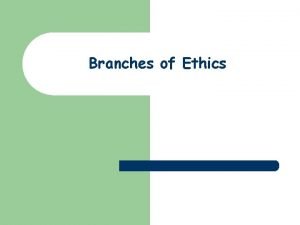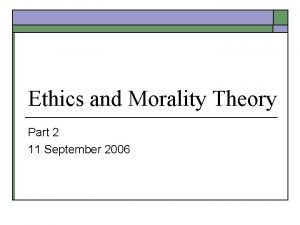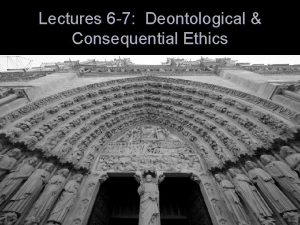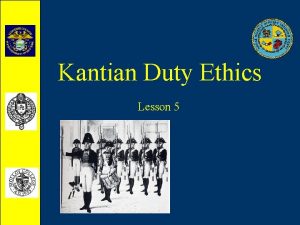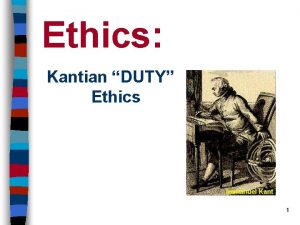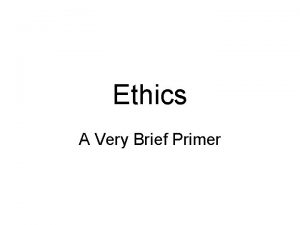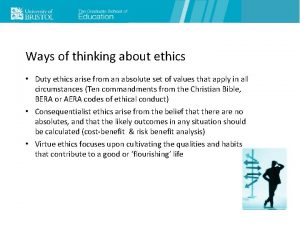The Ethics of Duty The Ethics of Duty










- Slides: 10

The Ethics of Duty

The Ethics of Duty • Duty and Religion – Ultimately, saved by faith and not by good deeds. • We are put on this earth to obey God’s commands. • Rewards are not on earth – reward is eternal life in heaven. Though, pleasure may be found in the sheer joy of pleasing God. • First Commandment, “Thou shalt love the Lord thy God, with all thy heart, all thy mind, and all thy strength. ”

Religious Ethics • There arguments for & against religious ethics: Advantage of Religion: Provides sanctions. Criticism: Sanctions are too remote. • Advantage: Faith in God is the center of a One’s life. • Criticism: Social utility should be number 1 for a moral person, not incidental to following God’s word. Time spent in Mosque could be time spent feeding the poor, for example.

Religious Ethics • Criticism: Religious dogma can lead to tragedy. – Also, religious dogma can stifle inquiring minds. • Reply to criticism: Fallible human beings are to blame for these tragedies, not religion properly understood.

Religious Ethics • Advantage: Religion has good uses. • Criticism: Do we teach people to believe in a certain religion because it is useful or because it is true?

Natural Law • The theory of natural law has three main parts: – 1. Theory of Natural Law rests upon a certain view of what the world is like. This view holds that the world has a rational purpose built into nature. Everything in nature has a purpose. 2. The “Laws of Nature” not only describe how things are but how they ought to be as well. 3. We can grasp the “Laws of Nature” because God has made us rational creatures.

Natural Law • Criticisms of natural law: – What makes something “unnatural? ” Hearing aids are not found in nature. Diseases are found in nature: cures are unnatural because they are discovered by humans? – Is being natural always good?

Kantian Ethics • Commandment: Love thy neighbor as thyself. – What does this mean? Should you love the entire human race equally? Even serial killers? – Should you love everyone as much as you love your own family? – What if you are working on a project and some remote acquaintance is hungry and needs food? Should you drive a half day to feed him/her? Should you do this for everyone? Do you really have to “sell all thou hast and give to the poor? ” Then you will be poor and forced to rely on the possible charity of others. – Golden rule can be problematic because of different strokes for different folks.

Kantian Ethics • Kant’s Theory of Duty – Animals act from inclination. – Only human beings are capable of acting on principle. – Feelings and attitudes differ from person to person. However, reason is universal. If A is larger than B, and B is larger that C than A is larger than C universally. Every rational person would have to agree with this conclusion.

Kantian Ethics • A hypothetical imperative is different than a categorical imperative. • The Categorical Imperative: Act only according to that maxim by which you can at the same time will that it should become a universal law. • Charity and Payment of debts are Kant’s examples. • the character of the act itself rather than the consequences is what matters • the character of the act itself is determined by it’s maxim. • Case of murderer looking for friend and Kant’s response. • Critics ask why there can’t be exceptions and qualifications.
